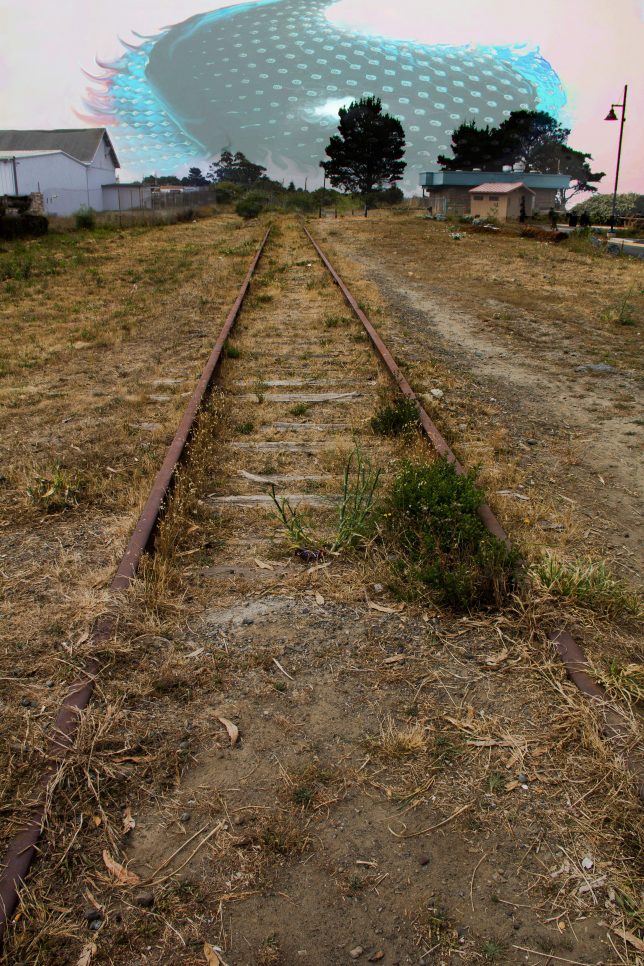Category: Life
-
I Still Prefer Black & White
Two samples, same scene. Which do you all prefer?

 Now, I like both versions, but for completely different reasons. I respond differently. My preference has to do with a deeply experience æsthetic recognition that has to do with time and depth. Somehow, the black & white feels more substantial than the color.
Now, I like both versions, but for completely different reasons. I respond differently. My preference has to do with a deeply experience æsthetic recognition that has to do with time and depth. Somehow, the black & white feels more substantial than the color.In any event, something nonpolitical for your consideration.
-
Way Station
It’s getting down to the wire. That will make sense later. For now, a contemplation and a photograph.
This weekend past was Archon. Number Forty. 40. Donna and I have been attending this, our hometown con, since 1982, number six. I’ve missed a couple, I think we missed one, but by and large it has been a regular thing. In years past, some of the vitality seemed to go out of it. They had some hiccups, which are now quite obviously in the past. This one was pretty damn good. Writing and books were more evidently on the menu and the panels I attended were well attended and well received. Even the Sunday ones.
For my part, there was a pre-con event last Thursday evening at the Brentwood Recreation Center. I hope to establish this as a regular thing, a Thursday evening event with the GoH, Toastmaster, and perhaps one other writer, sponsored by Left Bank Books with the convention. This year, Ellen Datlow and Bradley Denton were our guests, along with Ann Leckie. It was a fun evening. My intention is to broaden the scope of science fiction/fantasy for a general audience, draw attention to Left Bank Books as the go-to bookstore in St. Louis for speculative fiction (as well as all the rest), and spotlight these writers and editors for people who don’t normally attend the conventions. I ferried Ellen and Brad across the river to the event and moderated the talk, which took on a life of its own.
It seems remarkable that, in hindsight, we’ve made friendships which depend on annual visits. Great people show up at these conventions and I got to see them. Lynn and Selina of Yard Dog Press, who publish my work but, more importantly, are part of the rich community I am pleased to be part of. Vic Milan, the apparently permanent M.C. for the Archon masquerade, which always produces some remarkable entrees. Mitch Bentley, artist, as well as Allison Stein, John Kaufman (who did the terrific cover for my short story collection Gravity Box), Michelle and Rich, who run the art show, which is now becoming another regular feature for me.
Connecting up with Brad was a treat. I guess I’ve known him since 1992 or so. He is a fine, fine writer, a blues musician, and one of the best people I know. He’s had a rough few years lately and I wish him all the best. I’d like to read more of his fiction. If you haven’t read Brad, do so. Find his books.
I got to meet one of my favorite actors, if but briefly. Claudia Christian, who played Susan Ivanova on Babylon 5, a show Donna and I have been binging on since the unfortunate death of Jerry Doyle, who co-starred as Security Chief Michael Garibaldi.
All in all it was a good con. If I am a bit melancholy it’s only because I get to see some of these people at such long interludes and the pressure of time weighs more each year.
But. The art show. I actually sold a piece this year. This one, in fact. But I had a couple of new pieces as well. This is one, which I call Way Station.
 Others may interpret it differently, but I’m sticking with the title, a reference to Clifford Simak’s terrific novel. (Another one which, if you haven’t read it, do so. Too many good things are forgotten because they get buried under the avalanche of shiny new baubles.)
Others may interpret it differently, but I’m sticking with the title, a reference to Clifford Simak’s terrific novel. (Another one which, if you haven’t read it, do so. Too many good things are forgotten because they get buried under the avalanche of shiny new baubles.)I’m particularly pleased with the fantasy images I’ve been producing the last few years. I’m getting better, I think.
I don’t know when the next con I’ll attend will be. No doubt Archon 41, but other than that? It depends on much. I’ve handed in the current novel to my agent, I’m working to finish another one (possibly a YA), and I need to write some short stories, some by request. I’ll be busy this winter.
Meantime, to all my friends who I see far too seldom—be well. I’d like to see you again, sooner than later.
-
Finished
I have completed the current version of my new novel. Nits have been picked, threads tucked, and spells checked (I hope!) and it is off my desk.
Every time I get to this place, I crash. Yesterday I hit the couch for some of the deepest nap-time I’ve had in recent memory. When I come out of it, I look around at the ruined landscape of my environment, at all the things that have been on hold while in hot and sometimes panic-driven pursuit of the final draft, and I plan on how to put it all back into some kind of order. Cleaning. Getting reacquainted with the dog. Maybe attempt to catch up on some reading.
But that first day or so after is usually taken up by just drifting from room to room, contemplating what I am not about to do in the next hour, being lazy. Sighing a great deal. Maybe playing some music (not well) or doing some photo work.
Which I did this morning. Archon is coming up and I’ve elected to be in the art show again. I have some new images that need finishing up and prepping. I did a couple of those but mainly I played.
So until I get serious about tomorrow, here’s an image as place holder. I shot this in Kansas City recently, with my phone. Now, the pixels in the phone and the resolution leave much to be desired, but it ain’t bad, and if I work some magic in photoshop I can get some interesting stuff. For this, though, I went old school, just because I like the lines and the mood.
Now, compare that to the one below, which I shot in Dallas with my SLR.
A bit of a theme going on here? Yeah, well.
I have a ton of work to do in the coming year. Fingers crossed, you will be seeing some new short stories from me. I’ve been invited into a couple of anthologies and while in K.C. at the worldcon I got more than a few “Where’ve you been and when will you send something to me?” from some people. I know, it surprised me, too. Who knew I’ve been missed?
So, recovery for a couple of weeks–Archon in two weeks away–and the more grindstone time. My nose is diminishing even know.
-
50
I was eleven when Star Trek premiered. I’d seen the previews all summer, I was salivating in anticipation. Just from those minute or so clips it looked just so cool!
We watched the first episode—Man Trap—and disaster struck.
See, I was a somewhat “sensitive” child. I hate horror. I was prone at an earlier age to nightmares. I recall a couple of times waking up screaming. Of course, I’d been like four or five. It had been years. But my mother was adamant about keeping me away from anything that would curse my nights and ruin their sleep. She was skeptical that this—this—Star Trek Thing—wasn’t just another monster show. I remember trying to persuade her that, no, it’s about spaceships and other planets. No monsters.
Well. What was the thing in Man Trap other than a classic scary monster?
I missed half the first season because of that shaggy critter.
We lived downstairs from my grandparents and I took to sneaking up there to watch it. They had an ancient ANCIENT television, in a pale maple cabinet and a very low-res gun painting the picture on an old tube, so the picture was anything but sharp.
Even so, there was something about it that just took hold.
It is difficult sometimes to explain what Star Trek meant to someone like me that year. It was amazing. It was miraculous. It was where we wanted to go.
Somehow, Roddenberry and his writers had constructed a thing that had life beyond the edge of the television tube. We knew the Federation had length, breadth, and depth. It had substance. It was a place. Not like anything else on tv at the time that could even begin to call itself science fiction, this was a universe and we knew it would welcome us in if we could just–just—kind of—maybe—slip in there, past the electrons, and sort of step through.
Of course, it did what written SF had been doing for a long time. The difference was the medium. I never knew anyone else growing up who was remotely interested in reading the books and magazines I did. Everyone watched television and more than a few watched Star Trek.
It embedded and evoked an idea of the world and life that extended beyond the ordinary in a way that far exceeded its primitive SFX and pasteboard sets and often mediocre scripting. It wasn’t the individual episodes that mattered, it was the proposed future portrayed.
We didn’t have any of that stuff. Today we have a lot of it.
I saw the entire first run eventually, all in brilliant black-n-white. We didn’t have a color tv till the latter part of the Seventies.
It didn’t matter. I could close my eyes and see all the colors.
My dad, who had a problem with obsession, didn’t like my growing dedication to the show. “Split your head open with an axe and a bunch of starships would fly out of it,” he would say, as if that were a bad thing.
Well, it wasn’t school work.
But today I’m a published science fiction writer, and I didn’t learn how to do that in school.
More, though, in some way the optimism and vision of Star Trek became part of my general make-up. I think I’m a better human being because of it.
It was just so fucking wonderful.
Happy Anniversary.
-
A Couple Of Observations About The Culture
I’ve been working my way through Mario Vargas Llosa’s intriguing little book Notes On The Death Of Culture, which intends to be a general critique on the state of high culture and the impact its enervation has had on the world at large. Reading that and watching the election campaigns is a strange thing.
One of Llosa’s main themes here is that we have demoted “high” culture through a process of democratization of self-brutalization via social media and a mistaken acceptance of the idea that everyone’s opinion carries equal weight. That we no longer value wisdom, quality, or know how to appreciate it as distinct from middle or lowbrow culture, so-called “popular” culture.
There’s something to this, certainly, but I hesitate to call it a death. A tumultuous sorting maybe. Because side by side, cheek by jowl, as it were, with undeniable banality, dross, and effluence that passes for æsthetic content—no, that’s not quite fair, is it? Garbage has an æsthetic quality, even if it can only be apprehended as a negative—that presents itself as of equal value and merit to works of genuine worth, we do see works of superior quality, intent, and impact. In fact, work being done now in all the arts offers examples equal to if not better than any masterpiece of the past. Even television, that vast wasteland, offers amazing work. If one looks for it one may find music, painting, photography, sculpture, literature both fictive and nonfiction, drama both on stage and recorded, that compares with the finest humanity has ever offered.
And with it, audiences. You might question their level of appreciation, but that has two aspects which negate the attempt. Firstly, how do you gauge “appreciation?” How can anyone determine the extent of comprehension, of response, of, finally, “takeaway” experienced by another human being? You can’t really, certainly not in any way that might be revealed in a poll or a survey. Certainly not as some prognostic assessment about the Culture. Secondly, those creating these works have not come from another planet. They emerge from among us. We, in some way, “produce” them. They are us, they are not alien, so if in fact what they do cannot be understood or appreciated or even recognized, how then do they appear? The fact is, they have an audience. And not, judging by the availability and public knowledge of the work, small, dying audiences.
Which means we are, irritatingly, forced to take on faith that the culture, whatever we might mean by that, is not dying. Transforming, sure, as culture always does. Isolation is harder to achieve, if in fact it is even desirable. We live in each others’ living rooms. At best, Llosa’s fears—which may be too strong a word—may have more to do with nostalgia than actual diagnosis.
But then there is this huge, gawping thing in our midst, this political circus, and it might be reasonable to wonder how much we may have lost in terms of “culture” that something like Trump can aspire as successfully as he has to the presidency. It is perhaps a handicap for many that the answers may be culture-based and insulting to a large group of people. But I think, for myself at least, that there is nothing wrong with affirming that some things are better than others and that all aspects of culture are not equal. When you see placards with gross misspellings and bad diction in service to poor logic and spiteful ignorance, it offends and perhaps causes one to hold back rather than indulge in the obvious assessments. But like the doofus who shows up at a formal-attire wedding in plaid shorts and tennis shoes with an emblazoned t-shirt and a product-placement ball cap, the initial conclusion may not be wrong.
Suggestions have been made that the GOP might intervene and force Trump to step down or even do something with the rules to make him ineligible. Hiding the blemish won’t cure it. Trump’s success, if not he himself, is an expression of a popular sentiment, an æsthetic, if you will, that has embraced the thing Llosa is, in part, talking about. He has brought them together, the subliterates, the banal, the velvet-paintings-of-Elvis crowd, those whose most trenchant popular icon should be Archie Bunker.
And they voted for him. Should the GOP try to remove Trump, understandable as the impulse may be, it will be a repudiation of the very people they have relied on and nurtured and groomed for over three decades. They have been largely unseen all this time because they have been salted throughout the larger culture, an aberration perhaps. But Trump has caused them to step forward as a group. We, the rest of us, can see them now. They’ve been there all along, but we have rarely encountered them in numbers so large we could not pretend they weren’t just fringe kooks, loonies, or family embarrassments.
Forgive my crudeness, but I’m engaging this problem the way they do. Name-calling, pigeon-holing, because it makes the unknown manageable. It is a practice we rightly abhor but is the obverse of recognizing a form of self-selection and commitment to a set of protocols. If it makes us uncomfortable to be confronted with a reality that has grown up in our midst, then perhaps we share some of the responsibility. We have as a culture been driven more by the shiny, the thalamic and hippocampic reactiveness that draws us to the bright thing at the expense, sometimes, of the good thing.
But then, what do you do with someone who has decided that truth and beauty are the same as a red dot sale at WalMart?
It’s perhaps one reason WalMart has been so successful.
Trump, finally, has caused nothing. He is playing to an audience. What he says is less important than the fact that there are people who like it. When he is long gone from the political stage, they will remain.
It’s a cultural problem.





